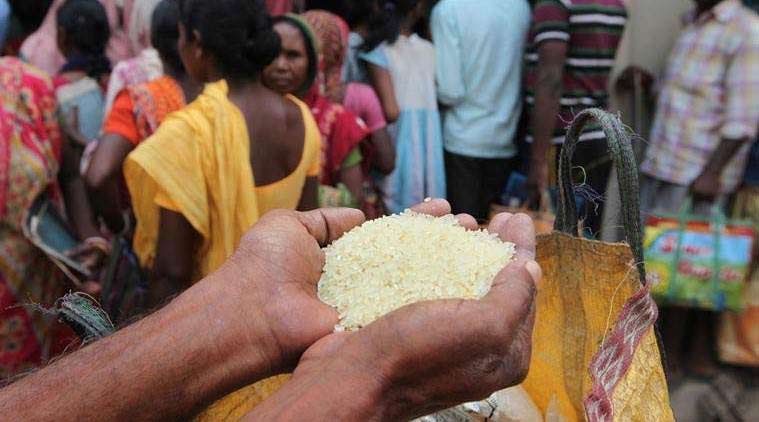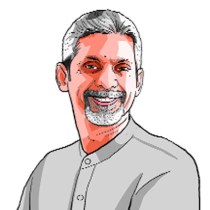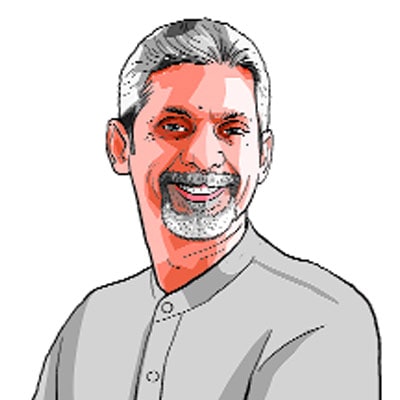Starvation deaths in 2018
Stunting due to hunger also holds back the prospects of an entire generation.

hose in power do all that is needed to prove that the person who died did so of “natural” causes, including resorting to ghoulish postmortems to find remnants of food in the victim’s stomach. (Partha Paul/Express File Photo)
Sections of the media and political establishment find it unthinkable that a person can die of starvation in India — we witnessed this recently when a 58-year old woman died in Jharkhand. The assumption, within a certain section, is that no one can die of hunger in this land of plenty and that government largesse ensures there is food in every belly. The very mention of the word “starvation” is enough to evoke hysterical reactions from our news anchors (needless to add, they don’t really need an issue to throw a tantrum). Opposition politicians shout themselves hoarse from their precarious moral high-ground. Those in power do all that is needed to prove that the person who died did so of “natural” causes, including resorting to ghoulish postmortems to find remnants of food in the victim’s stomach.
For example, when 11-year-old Santoshi died in September last year, the Jharkhand government claimed that the child had died of an illness. However, Santoshi’s family contended that they had not been getting rations for six months before her death. The case of 58-year-old Savitri Devi is similar. Her fellow villagers contended that Savitri Devi had nothing to eat in her home because she was denied PDS rations since 2012 when her ration card was cancelled. But Jharkhand government officials claimed that Savitri Devi died of “illness” and not hunger.
This unseemly debate of whether people die of hunger or illness baffles those who can enjoy the luxury of digging into their generous serving of munchies. Starvation deaths in 2018? How absurd in a country which, we were recently informed, is the fastest-growing economy in the world. A country where surplus grain is eaten by rats. Hunger deaths are an evil from our colonial past. And the media hoopla over one death would surely indicate that such incidents were rare. To the well-heeled, it seems that India has, in fact, conquered hunger.
But the truth is somewhat more disturbing, for there is no debate at all about the fact that India is home to the largest number of malnourished people in the world. About a third of our children are stunted: As the word implies, their bodies (and, indeed, their brains) are less developed than they should be for their age. And there is one overwhelming reason for this damning observation: They have gone to bed, day after day, month after month, without enough food.
UNICEF recently published a report estimating that malnutrition is a direct contributor to nearly half of all deaths under the age of five years. The final cause of death, of course, is never “starvation” or “hunger” but a more immediate ailment such as diarrhoea or pneumonia. But, the child dies because he or she is too weak from hunger, which has depleted the body of the necessary biological potions that would have staved off these diseases.
In other words, the child died of hunger.
How many children are we talking about in the case of India? More children under the age of five die in India than anywhere else in the world. A recent estimate puts this figure at over 1.5 million children a year—over 4,500 child deaths a day. A third of these could have been averted if children did not go to bed hungry night after night. These figures suggest that over 3,00,000 children die every year in India because of hunger. And for many children who escape death, the poverty of their parents means that hunger remains an unremitting part of their lives. Hunger does not stunt only the body, it also affects the brain. The result: An entire generation of children born into poverty with stunted intellectual development which traps them in the same poverty their parents lived with. A state of poverty which will ultimately kill them well before their fellow citizens who did not go hungry during childhood.
While it is plausible that the middle-aged people in desperate situations in Jharkhand and elsewhere did not die of acute starvation, it is more likely that their premature deaths were written into the scripts of their lives because they starved as children. It does not matter how fast our economy is growing when tens of millions of our children (and their families) go to bed hungry. Stunting due to hunger and its consequences on premature mortality is a major reason for the pathetic position India occupies in the human development league table of the world. It is also holding back the prospects of an entire generation of our children to survive and escape poverty. That it should be so prevalent, 70 years after Independence and with our food granaries stuffed, is nothing short of a national shame. As many other and much poorer countries have shown, eradicating hunger and stunting can be addressed but to do so will need action on an emergency scale. Only then will Indians stop dying of hunger.
The writer is the Pershing Square Professor of Global Health at Harvard Medical School and is affiliated with the Public Health Foundation of India and Sangath
For all the latest Opinion News, download Indian Express App
More From Vikram Patel
- When science masks hateThe medical legitimisation of prejudice was a major contributor to the stigma against homosexuality...
- Compromising positions: Time to reclaim sexuality from the self-appointed guardians of moralityWe should celebrate that young people are choosing to get married later in life, but reject the notion that this delay has any bearing on…
- Why they die youngOppressive social norms are behind rising suicides among the youth...








































No hay comentarios:
Publicar un comentario